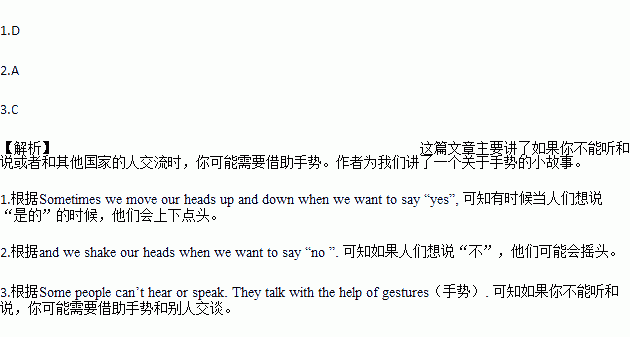题目内容
When we want to tell other people what we think, we can do it with the help of words. We can also do it in many other ways, too. Sometimes we move our heads up and down when we want to say “yes”, and we shake our heads when we want to say “no ”. Some people can’t hear or speak. They talk with the help of gestures(手势).People from other countries often have to do it if they don’t know your language.
Here is a story. An American was once having his holiday in Italy, but he could not speak Italian. One day he went to a restaurant and sat down at a table. When the waiter came, the American opened his mouth, put his fingers in it and took them out again. In this way he wanted to say “Bring me something to eat”. The waiter soon brought him a cup of tea. The American shook his head and the waiter understood that he didn’t want tea. So he took it away and brought him a glass of milk. The American shook his head again. He was very hungry now and looked sad. He was just going to leave the restaurant when another man came in. When this man saw the waiter, he put his hands on his stomach(胃). In a few minutes there was a large plate of bread and meat on the table in front of him.
1.Sometimes people move their heads __________ when they want to say “yes”.
A. right and left B. fast and slow
C. hard and easy D. up and down
2.If people want to say __________ ,they may shake their heads.
A. “no” B. “yes”
C. “words” D. “OK”
3.If you can,t __________ ,you may talk with the help of gestures.
A. write and read B. say or sing
C. hear and speak D. go or come
 一课一练一本通系列答案
一课一练一本通系列答案 浙江之星学业水平测试系列答案
浙江之星学业水平测试系列答案 高效智能课时作业系列答案
高效智能课时作业系列答案随着人们的生活水平越来越高,有不少人忽视了体育锻炼。你班学生就这一话题组织了一次班级讨论, 请对以下列举的体育锻炼的好处进行补充,并说说自己所喜爱的运动项目。
体育锻炼的好处 | 对身体有好处; 能够缓解压力; …… (至少补充两个要点) |
你喜欢的运动项目 | (请加以说明) |
【写作要求】
1.作文中不能出现真实姓名和学校名称;
2.不必写标题;
3.词数150左右。
【评分标准】
内容完整,语言规范,语篇连贯,词数适当。
____________________________________________________________________________________________
____________________________________________________________________________________________
____________________________________________________________________________________________
____________________________________________________________________________________________
____________________________________________________________________________________________
____________________________________________________________________________________________
____________________________________________________________________________________________
________________________________________________________________________


